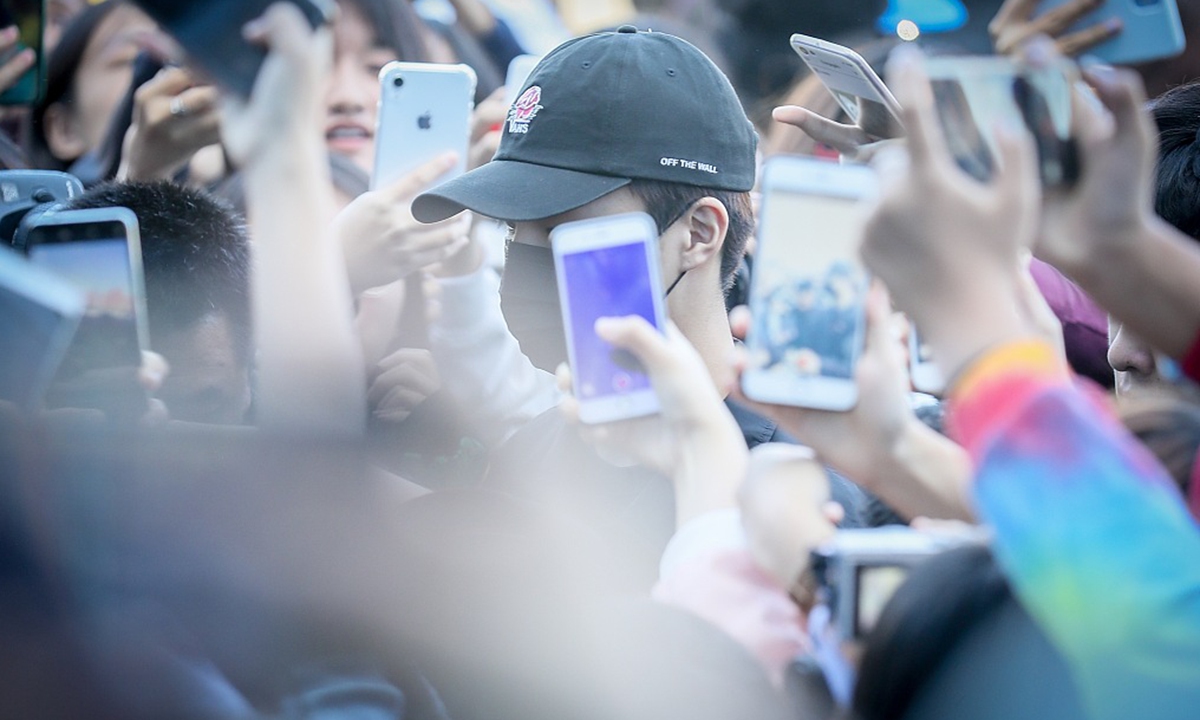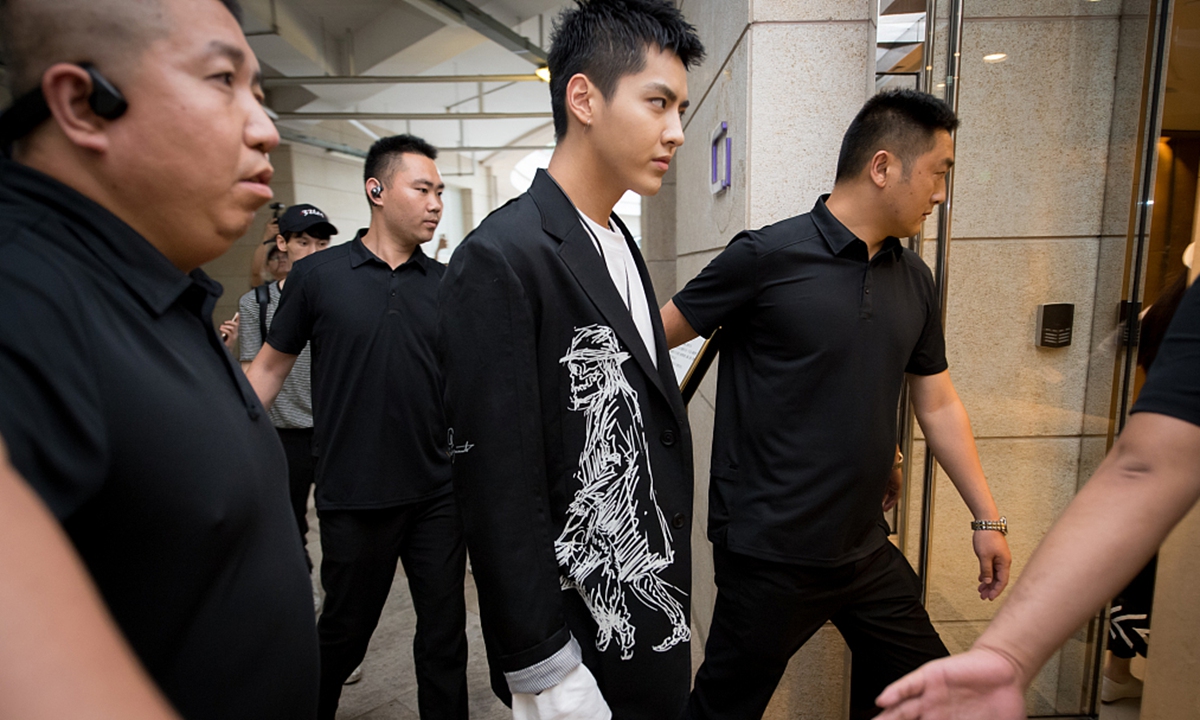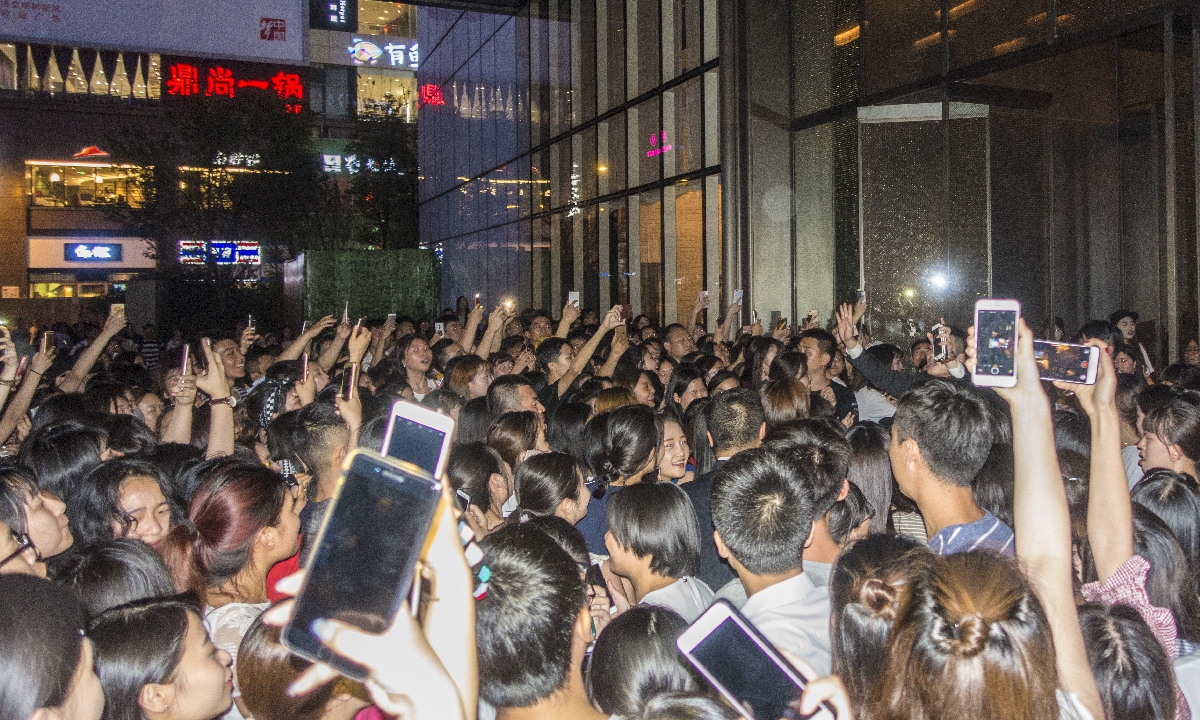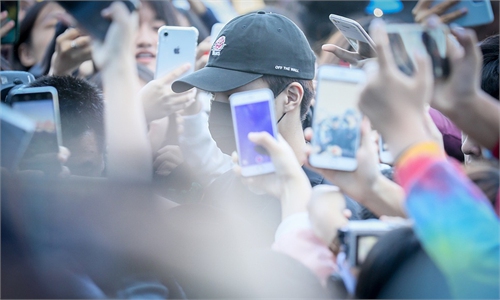China ups rectification of ‘fan circle’ culture which distorts minors’ values, endangers social governance
Simple thinking, combative nature of misled fans can be used by foreign forces, threaten political security

fans Photo:VCG
China's cyberspace regulator on Friday enhanced rectification with specific measures over the sick parts of "fan circle" culture in the entertainment industry, tackling the long-controversial moves by teenage fans that blindly idolize celebrities, excessively spend money on their "idols," and exclude others, as distorted values within the circles have also bred cyberbullying and illegal fundraising.
Some fans who engage in frequent verbal abuse with supporters of other celebrities, or blindly defending their scandal-ridden idols have recently prompted heated criticism online against such fandom culture, which is feared to pose a great danger to the development of the young generation and the mainstream values, ideological security and social governance.
The Cyberspace Administration of China (CAC) published a notice on Friday on its website asking provincial offices to heighten the efforts to rectify the fan circle chaos and make entertainment-related platforms perform their duties to ward off irrational idol worshipping.
The CAC specified 10 measures, urging enhanced sense of urgency to improve the fan circle culture to safeguard online political and ideological security, and supervise the platforms to implement the measures.
The measures include cancelling all ranking lists of entertainers, barring forums that pick fights and lead to chaos, and requesting agencies to better guide fan groups.
Before Friday's notice, the CAC in mid-June and July have launched campaigns targeting sick fan circles culture that adversely affected adolescence.
The CAC on Friday also published a draft set of rules on algorithm services, urging transparency and authenticity of statistics and data be put to good use. Observers believed the draft also serves to cleanse the entertainment industry given the reality of platforms and idol agencies colluding to manipulate rankings.
On August 6, China's major social media platform Weibo announced the removal of the "star power list," where fans spent large amounts of time, money and energy to keep their idols on a higher position. Search engines Baidu and 360 also shelved their similar lists of "stars influencers."
Weibo has been deleting verbal abuse posts and publishing information of account suspensions weekly since June to tackle verbal abuse and rumors concerning fan circles.
In recent weeks, dozens of mobile phone apps that can be used for fan fundraising, tracking idols' activities and lifting idol's rankings on different lists were removed from app stores.
The enhanced measures on fan circles come alongside the punishment of wrongdoing entertainers, including a 299 million yuan ($46.27 million) fine on actress Zheng Shuang for tax fraud, as China is determined to cleanse the industry of bad influences.

Chinese Canadian pop idol and former EXO member Kris Wu Yifan Photo:VCG
Sickened culture
Starting from a spontaneous gathering of a star's supporters, the exclusive fan circles have long been criticized by parents and the society, and a milestone figure brought the phenomenon to the sight of the public - actor Xiao Zhan.
Xiao's fans in February 2020 had a fierce clash with users of an overseas fan fiction site Archive of Our Own. The incident later evolved to clashing of fans and netizens disliking other fans' behaviors, resulting in large-scale cyber violence, a boycott of Xiao-endorsed products, and fans' firmer resolution to safeguard Xiao's career.
A recent exposure of fan circle culture was the fall of pop star Kris Wu Yifan, who was in late July accused by some women of underage rape and sexual assault. Some of Wu's fans cyberbullied those women and netizens who voiced support to those women.
After police started investigations and detained Wu for suspected rape, some fans continued to blindly defend him, even saying they would risk breaking into jail to rescue Wu.
A viral screenshot showed an alleged fan of Wu stating, "there are only about 2 million People's Liberation Army soldiers and about 2.5 million policemen in China, but Wu has 50 million followers on Weibo, we certainly could rescue him out of jail."
Wu was involved in a sexual scandal a few years ago, but a fan of Wu with the web name of "Righteousness" always believed that the disputes were out of a romantic relationship. The fan told the Global Times that her nine-year affection for the idol, and the time, money and emotions spent on him suddenly became a joke after Wu was proven to be a suspected criminal.
Another fan of Wu said "I didn't believe it and thought he was framed until he was sent to prison. Now I feel disgusted."
Fans groups were such an enclosed circle that any doubts or different views about the idol are not permitted. Young fans receive a single narrative and believe their idol is perfect, hence dedicating their time and money to defend "the perfection," Weibo user Yuheqiluo, a former "grassroots fan" of a Chinese actor, told the Global Times.
Fan circle leaders also spread rumors about other celebrities' scandals, or say their own idols were mistreated, to keep fans loyal. There are even trainings on tactics about online quarrels and winning over onlookers.
"People who are not brainwashed and question those tactics either fade away spontaneously like me or get kicked out after publicly challenging the 'opinion leaders,' the Weibo user said.
Many saw a similarity between fanatic fan circles and cults in their ways to build up a personality and mobilize and control followers.

Hundreds of fans gather outside a hotel where Chinese-Canadian pop idol Kris Wu was staying in Chengdu, Southwest China's Sichuan Province, in 2017. Photo: VCG
Affection or business
A 27-year-old former fan group organizer surnamed Jiang recalled her college years of dedicating large amounts of time, money and energy into operating fan groups.
Jiang was from a better-off family and gained some say in the fan circle after giving 50,000 yuan ($7,710) to help boost her idol's ranking on a certain list.
Many fan leaders have connections with the entertainer's agency or are even paid to mobilize fans. "Grassroots" fans think they are supporting their idols, but they are indeed free laborers and cash cows of a star, Jiang said.
Fans raise money to buy billboards to promote their idols, buy idol-endorsed products to prove the idol's commercial value, buy gifts for their idols' working partners, and spontaneously defend against negative comments, sometimes even very mild ones, about their idols, the Global Times learned. This work was previously done by the entertainer's agency but now fans do that without charging a cent.
Such fundraising reminds many of pyramid selling, and in many cases the spending is not transparent.
A court in Southwest China's Guangxi Zhuang Autonomous Region publicized a case on Thursday where a singer's fan circle leader raised 1.53 million yuan in the name of buying the singer's albums, but took 1.4 million yuan and disappeared.
In June, fans of boy band member Ma Jiaqi challenged Ma's company after they raised 300,000 yuan ($46,310) to send Ma for training purposes, but Ma failed to be admitted into a performance college after gaokao.
In May, a variety show where trainees compete to become idols sparked public outcry after the show's competition rules caused an enormous waste of bottled milk. As the show was sponsored by a milk producer, the more fans buy, the higher their idols rank.
The production platform of the show iQIYI apologized then, and on August 26 announced it would suspend idol-picking programs and cancel online voting amid the upgraded regulations.
For entertainment-related companies, fans are cheap laborers and a ready source of money, Yuheqiluo underlined.
Threats to values, order
Popular culture observers noted that younger fans whose value systems are still yet to be formed are more likely to become combative and act irrationally after indulging in fan circle culture. They are mobilized to do what "opinion leaders" ask them to do and seek a sense of collectivity and affiliation.
Zhang Yiwu, professor of cultural studies at Peking University, told the Global Times that interaction within fan circles makes the groups very cohesive and repel different voices.
Zhang warned that youngsters' understanding of people and society is weakened and simplified when they stay in fan circles, where everything or everyone is either black or white, no middle ground or complexity.
Simplistic thinking makes fan groups an easy target for vicious people and foreign forces to make use of, comprising a huge threat to national ideological security, some experts noted.
Simple judgment, all-or-none thinking also lead to the phenomenon of uniting people with the same view to attack those with different views, which has extended to discussions on many social issues.
Taking women's rights as an example, it requires negotiation, consultation and cooperation from different parties, but the spillover of fan circle mentality can make practical communications impossible, observers said.
"We are in urgent need to manage fan circles and rectify these youngsters' ideologies, guiding them to support their idols in a rational manner, which needs cooperation from all related parties," Zhang noted.
How the youth think and act will determine the future of our country, that's why the entire society must create a healthy environment for their development, experts said.

